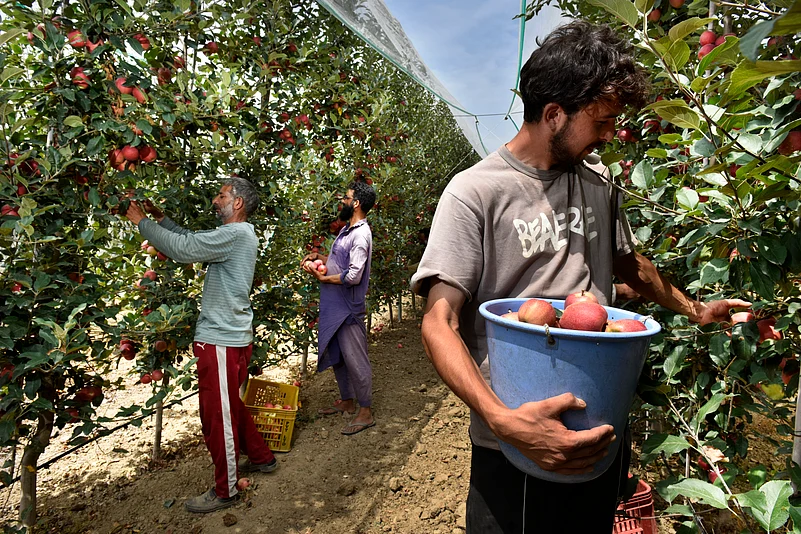
Kashmir's horticulture has taken fresh big hit after latest Trump tariffs.
J&K produces 3.5 lakh quintals of walnut, 98 per cent of India's output.
Over seven lakh people depend on apple trade in Kashmir.
After completing his bachelor’s degree in computer application from Pulwama in 2021, Furqan Akbar, 26, started a dry fruit export business with the United States comprising his main market. The annual revenue generation of his company from the US market has been nearly US $1 lakh. However, after US President, Donald Trump, took the total tariff on exports from India to 50 per cent, he has not received any fresh orders from his customers. Thereafter, the number of people running his business has shrunk, from two to three, and no fresh stocks have been lifted from growers.
Now, instead of a fully stocked godown, he stares at empty walls. “Orders have dried up; it's a major setback. Apart from dry fruits, I used to export saffron to several markets, but our main buyers were in the US,” said Furqan. “Before the hiked tariffs, we had been receiving supplies from growers, but now our godown is empty,” said Furqan. He said that with the new tariffs significantly increasing the per-kilo cost of walnut and almond (from Rs 1,200 to 1,800), the company's US buyers have informed him they could look for alternate markets.
The hike in export tariffs has come as a major set back for the Kashmir's horticulture sector which has been reeling under the impact of imports of Washington apple and California walnuts and almonds. At the production level of 3.5 lakh quintals of walnut every year, Jammu and Kashmir contributes nearly 98 per cent of the total walnut output of India, and over seven lakh families depend on the apple grown in Kashmir's orchards.
The heavy import of apple and dry fruits from the US has in recent years reduced the demand and the resultant prices of the local produce. Growers have been demanding that the authorities should increase the tariff on the import of both the dry fruits and apples from the US to help them curb the losses.
Now, after the hike in the US tariffs, farmers in Kashmir fear that India may be forced to reduce import tariffs for US produce, which would further hit the growers.
In a recent letter to Prime Minister Narendra Modi, the Kashmir Valley Fruit Growers and Dealers Union urged the central government to increase the import duty on the Washington apple to 100 per cent to protect the local industry. Noting that over seven lakh families in the Valley depend on the horticulture industry, and as India is one of the largest apple producers, the union said that US imports were heavily affecting local growers. According to the union, there were fears that, on the contrary, a reduction in import duties on American apples will further hit the industry hard.
Experts and traders said that due to heavy imports, the prices of apple and almond in Kashmir have dropped. “The apple imported to India is grown using pesticides, but our product is organic. We have sought an increase in import duties so that the local economy is not hurt,” said Bashir Ahmad Bashir, president of the Kashmir Valley Fruit Growers Association.
Prominent Kashmiri economist Prof Nisar Ali said, “Apart from the handicrafts sector, horticulture is directly impacted by the tariff [tussle] between India and the US.”
According to traders, the imports from the US are often undervalued, due to which their business has suffered badly.
Zia-ul-Islam Mir, a dry fruit trader in north Kashmir’s Kupwara, said that the walnut market has been heavily damaged by imports of Californian varieties. “There is not much of a difference in the prices of Kashmiri walnuts and those from the US. Each kilogram of imported walnut costs Rs 400-500, against Rs 300-350 for Kashmiri walnuts. The market for the local produce has taken a massive hit due to this,” said Mir.
Bahadur Khan, a dry fruit trader, said that walnut and almond were being undervalued and dumped in markets across India, destroying the economy of Kashmir.
“Action was taken earlier in Mumbai when undervalued walnut and almond imports from the US were seized. We have approached the authorities to curb this further, but there has been no action,” he said.




























